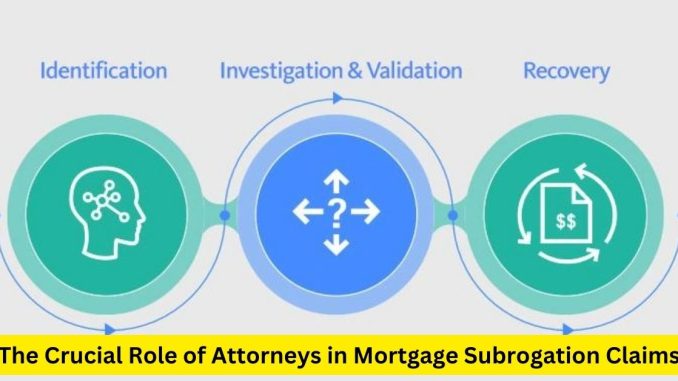
Mortgage subrogation claims are complex legal proceedings that involve the transfer of a lender’s rights to a third party, typically an insurance company, after the lender has paid out a claim to the homeowner. In these cases, attorneys play a pivotal role in navigating the intricacies of the process, ensuring fair outcomes for all parties involved. Let’s explore the essential role of attorneys in mortgage subrogation claims.
- Legal Expertise and Representation: Attorneys specializing in mortgage subrogation claims possess in-depth knowledge of property law, insurance regulations, and contract interpretation. Their expertise allows them to represent the interests of lenders and insurance companies effectively throughout the subrogation process.
- Reviewing Mortgage Documents and Insurance Policies: Attorneys meticulously review mortgage agreements, insurance policies, and any relevant legal documents to determine the rights and obligations of all parties involved. Understanding the terms and conditions laid out in these documents is essential for building a strong case in support of the subrogation claim.
- Identifying Subrogation Opportunities: Attorneys assess the circumstances surrounding a homeowner’s insurance claim to identify potential subrogation opportunities. Whether the claim arises from property damage, liability, or other covered perils, attorneys analyze the facts to determine if the lender is entitled to seek reimbursement through subrogation.
- Negotiating with Insurance Companies: Attorneys engage in negotiations with insurance companies on behalf of lenders to maximize the recovery of funds through subrogation. Skilled negotiation tactics and legal advocacy are employed to secure favorable settlements that compensate lenders for their losses.
- Litigation Representation: In cases where insurance companies dispute the subrogation claim or refuse to provide adequate compensation, attorneys provide litigation representation. They advocate for their clients’ interests in court, presenting compelling arguments and evidence to support the validity of the subrogation claim.
- Resolving Legal Challenges: Mortgage subrogation claims may encounter various legal challenges, such as statute of limitations issues, jurisdictional disputes, or questions regarding liability. Attorneys adeptly navigate these challenges, utilizing legal strategies to overcome obstacles and achieve successful outcomes for their clients.
- Advising on Risk Management Strategies: Attorneys offer strategic advice to lenders and insurance companies on risk management strategies to minimize exposure to future losses. This may include reviewing insurance coverage options, modifying lending practices, or implementing contractual provisions to protect against potential subrogation risks.
- Ensuring Compliance with Regulatory Requirements: Attorneys ensure that all aspects of the subrogation process comply with applicable laws, regulations, and industry standards. Compliance with legal requirements is critical to maintaining the validity of the subrogation claim and avoiding potential legal pitfalls.
- Facilitating Efficient Resolution: Attorneys work diligently to facilitate efficient resolution of mortgage subrogation claims, recognizing the importance of timely reimbursement for lenders. Their proactive approach helps expedite the claims process and minimize disruptions to the lender’s operations.
- Protecting the Rights of All Parties: Ultimately, attorneys play a vital role in protecting the rights and interests of all parties involved in mortgage subrogation claims. Through their legal expertise, advocacy, and strategic guidance, attorneys ensure that the subrogation process is conducted fairly and equitably.
In conclusion, attorneys play a crucial role in mortgage subrogation claims, providing invaluable legal expertise, representation, and strategic guidance throughout the process. Their efforts are essential in securing reimbursement for lenders and navigating the complexities of subrogation proceedings effectively.

Leave a Reply